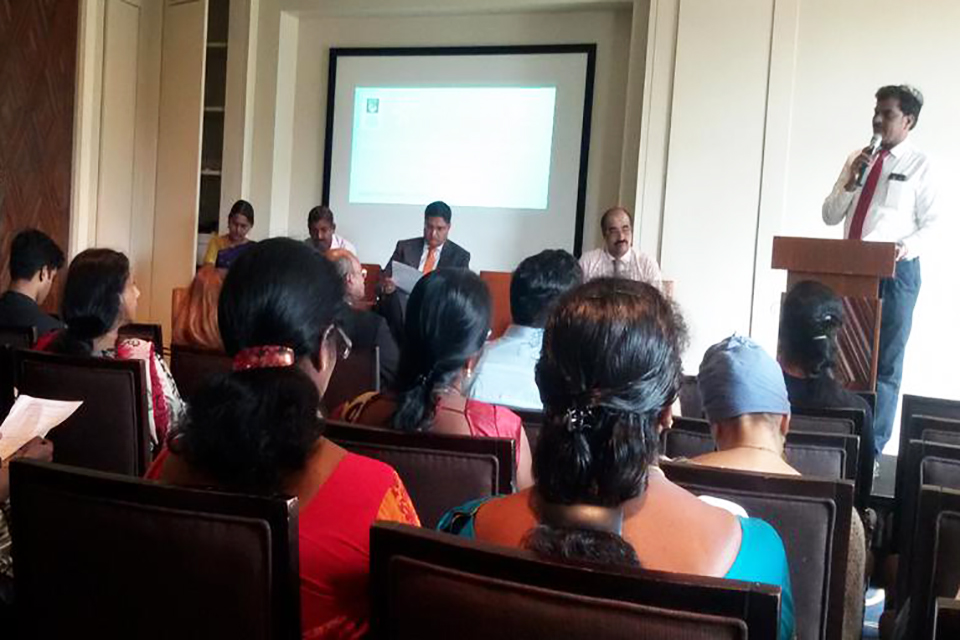'Building holistic support for women survivors of burn violence'
Transcript of a speech by Bharat Joshi, British Deputy High Commissioner Chennai at Tamil Nadu State Policy Roundtable in Chennai, Saturday 21 January 2017.

Like all of us, I owe much to my parents. But it’s probably fair to say that the best gift I had was an unintentional one, that I was born as a man. The fairer sex are without question treated worse than men across the world. In the workplace, women progress more slowly and are paid less than their male counterparts. A shockingly high number face harassment. And women are overwhelmingly the victims of domestic and sexual violence, including burns attacks.
The British High Commission has a long and growing tradition of supporting work that aims to prevent and tackle violence against women. That’s why so much of our work is aimed at supporting victims by helping improve systems that support the victims of sexual violence and now burns victims, and by helping build women’s leadership and entrepreneurship skills through programmes like SheLeads.
With the project implementer, PCVC, we wanted to shine a light on one of the most under-serviced and most neglected areas of violence against women. We also wanted to share lessons from Tamil Nadu’s successful public-civil society-private partnership to support women survivors of burn violence as a model for other States as well as to develop the conversation here in Tamil Nadu. We wanted to share the importance of integrating psycho-social support with medical support to ensure women aren’t merely victims but move swiftly from being survivors to thrivers. We wanted to share examples like Coimbatore’s Ganga Hospital which, recognising that most burn survivors are poor and unable to afford expensive hospital and post-hospital care, works with civil society to offer surgeries at low or no cost. Ganga also has one of India’s 7 skin banks and is working with Kilpauk Medical College & Hospital (KMC) to explore ways to improve skin bank network and infrastructure. We wanted to share innovative approaches like Kilpauk, itself a pioneer of burn-care, which works with patients to record their version of how they were injured to help their psychological recovery.
Many Lawyers in Tamil Nadu (TN) have provided free legal advice, via the TN State Legal Services Authority, in government hospitals to ensure women are aware of their rights and the consequences of reporting an ‘accident’ as opposed to a ‘crime’ with implications for dying declarations, protection orders, residential orders, and custody orders for any children.
This project will also help build a network of survivors in the four target states of Tamil Nadu, Telangana, Maharashtra and Delhi who can help each other and build networks of public-private support services. And discussion across India will feeding into PCVC’s new handbook for burn-support practitioners which will be translated into Tamil and other languages to help this new guidance reach a wide range of practitioners in the coming years.
PCVC is separately in discussion with the National Informatics Centre (NIC) to explore ways of improving recording of burn incidence, including a more comprehensive and accurate National Burns Registry.
I’m glad that PCVC are in touch with representatives from the National Programme for the Prevention of Burn Injuries (NPPBI) today. I know the Government of India has ambitious plans to improve burn-care infrastructure across India and several hospitals in Tamil Nadu have received approval for burn units in the Five Year Plan. This is good news. I hope this project will offer new knowledge, research and insight to NPPBI’s national thinking and ambition.
Of course longer-term solutions require cultural change that embeds gender equality and respect across society. But to those who say that it’s all too hard, too impossible, we’ve got a small video-clip (see below) of the UK supported Bangladesh experience in helping burn survivors, especially acid survivors. As you’ll see, excellent awareness and advocacy work was done by the Acid Survivors Foundation in Bangladesh. That proves that it’s possible for local-level, grassroots practitioners, public and private, healthcare and non-healthcare, civil society and wider to come together and evolve effective systems and procedures that women survivors can benefit from. It’s not only possible, it’s imperative.
I’ll close with a grim reminder of why we’re here. In August 2016, media reported that a 17-year old girl – the same age as my oldest daughter - in Villupuram District was set on fire by a man who had been stalking her and whose advances she had clearly and repeatedly refused. Her burns were so severe that she died soon after being admitted to hospital.
Thank you all and my very best wishes for productive discussion today.